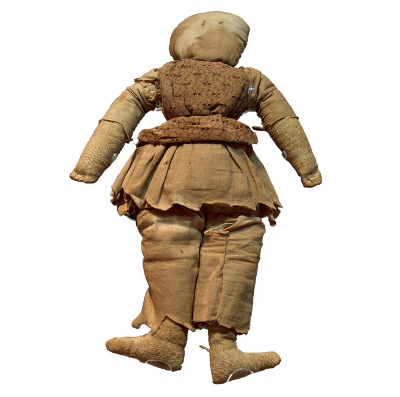
After Robert E. Lee formally surrendered to Ulysses Grant in the parlor of Virginia grocer Wilmer McLean, relic hunters descended on the house. “Large sums were offered Major Wilmer S. McLean for the chairs in which the generals sat during the meeting — for the tables on which the writing was done — for substantially every article of furniture,” wrote correspondent Sylvanus Cadwallader. Many souvenirs were taken without McLean’s permission — including the rag doll belonging to his 8-year-old daughter, Lula, “which the younger officers tossed from one to the other, and called the ‘silent witness.'”
In a 1951 Saturday Evening Post article, “The Lost Rag Doll of Appomattox,” Dorothy Kunhardt wrote, “Eighty-six years ago a little girl lost her rag doll. It was a very much hugged and slept with and beloved rag doll, homemade; no china head and kid-glove fingers and lacy dress, but stumpy burlap arms and legs, clothes assembled from the family rag bag and a small, potato-shaped head with not much stuffing on it.”
Philip Sheridan’s aide-de-camp Thomas William Channing Moore took the doll home with him to New York, and it was passed down within his family for 128 years. Finally, in 1993, when Moore’s grandson Richard died, his wife called the Appomattox park authorities to say that they were ready to return it. “The men in our family never wanted to give her up,” Marjorie Moore said. “The women thought Appomattox would be the best place for her.”
The doll resides today in the Appomattox visitors’ center, but perhaps that’s too late to redress the harm. Years earlier, after ranger Cynda Carpenter had told the story to one group of visitors, an older woman approached her and identified herself as Lula McLean’s great-granddaughter. “She said that Lula never got over the hurt caused by the loss of her doll,” she said. “She said that Lula told her, ‘The Yankees stole my doll.'”
